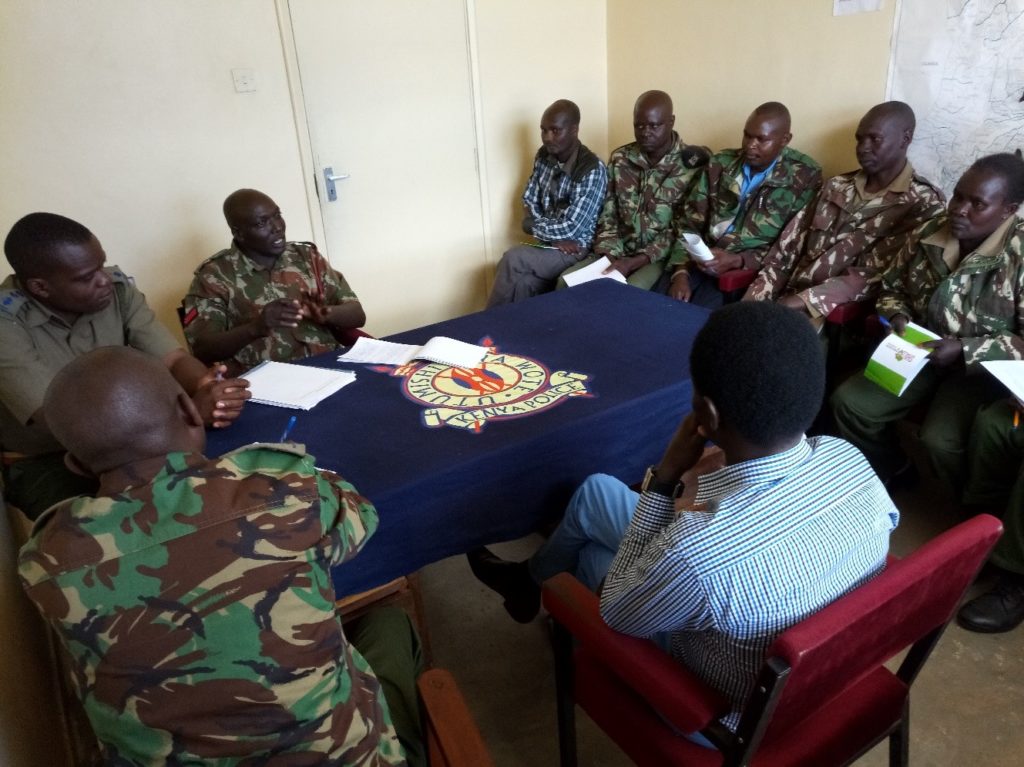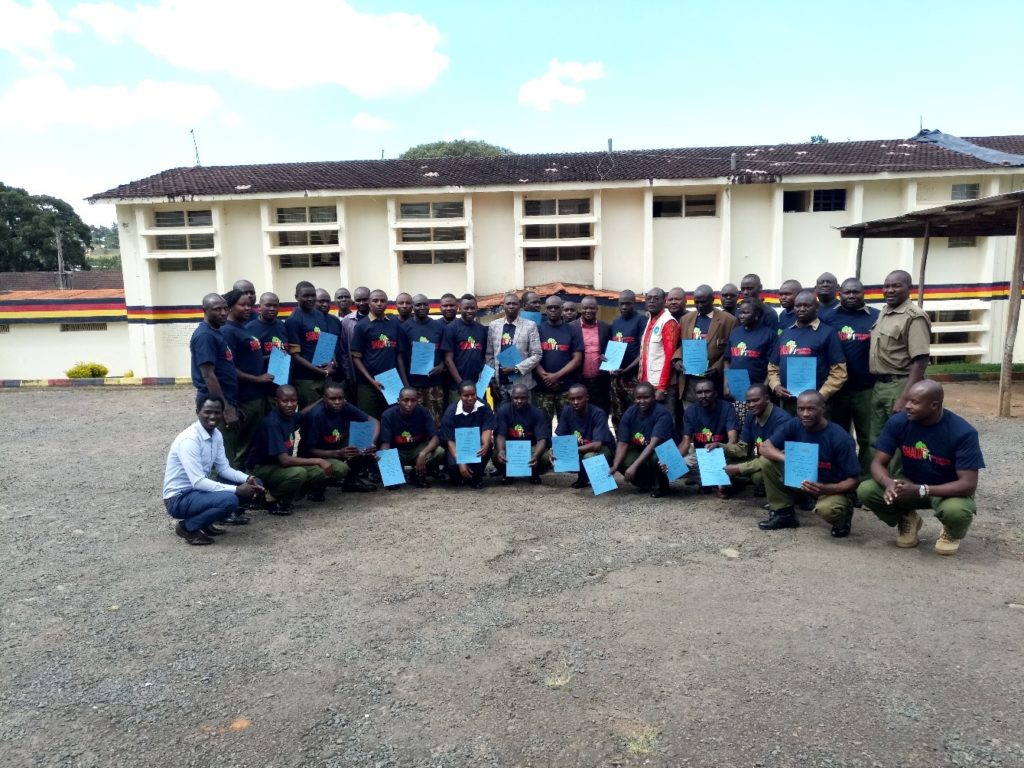According to West Pokot County Commissioner, Apollo Okello;
“Shalom Center for Conflict Resolution and Reconciliation (SCCRR) is a unique organization, the first to train and boost the capacity of our security officers with knowledge and skills of alternative dispute resolution mechanism. The organization’s philosophy, belief and way of working transcends ordinary knowledge. We really appreciate all you have done to help us get new approach to conflict resolution hence, save more lives.”
Post conflict peacebuilding is a big challenge facing Northern Kenya and Kenya at large. It comprises of various processes, roles and sequential activities proceeding from cessation of hostilities to economic reconstruction. West Pokot County is one of the 14 Counties in the Rift Valley region. It is situated in the North Rift region, along Kenya’s Western border with Uganda. It borders Turkana County to the North and North East, Trans Nzoia County to the South, Elgeyo Marakwet County and Baringo County to the South East and East respectively.
In the recent past, West Pokot County has time and again hit the headlines for the wrong reasons. Retrospectively, both county and national governments have been harshly criticized for failure to transform conflict among ethnic communities that interface in this region. Violent conflicts in West Pokot have since multiplied in complexity and intensity. These conflicts are associated with ethnic rivalry, violence resulting from border disputes, and competition over natural resources. In the recent past, West Pokot County has witnessed an increase in the number of police interventions as a result of the rising violence across the County.
The gap in response mechanisms to mitigate conflicts and the reputation of SCCRR in the region prompted the policy makers, Kenya Government, through the ministry of interior defense, national steering committee on conflict and peacebuilding to invite SCCRR for capacity building workshop with the main objective to enhance the capacity of the Kenya police on Conflict Early Warning and Early Response. The workshop was held on 18th and 19th October 2018 at Kapenguria Police Headquarters, in West Pokot County. The workshop attracted 56 senior government official including; Administrative leaders, county commissioner; Security Agents (Police, AP, GSU & NPR), Peace Committee Members (CJPC) and District Peace Committee Members (DPC). The workshop was facilitated by Dr. Peterlinus Odote Ouma, Ph.D, Mr. Paulson Erot, M.A, and Mr, Cyprian Nyakundi. The workshop explored the whole area of conflict early warning and early response systems with a view of applying the concept to improve security in West Pokot County. The police were taken through a session of identification of conflict early warning indicators and signs in the context of West Pokot County; and be able to design conflict early warning system applicable to the context of West Pokot County. The thematic agenda of the discussion laid significant emphasis on the understanding of both structural and proximate causes of conflict, as well as efforts to avert causes before the outbreak of violence.
Discussions with the police revealed that: political assassination of key leaders; election malpractice/rigging; incitement from political leaders; increase in economic inflation; history or presence of unresolved ethnic conflicts; increase in ethnically or religiously motivated attacks; increase in the proliferation of small arms and light weapons; increased number of assaults on security teams; corruption in the judicial circles and injustice in judgment of cases in courts are strong signs of overt conflict escalation.

The Police and Shalom’s Paulson Erot, M.A. engaging in a group discussion
To transform these conflicts, the discussions reinstated the inevitability of resolving the root causes of conflict and the strategy lies in the very reasons that cause them. Early warning system and response architecture designed by the participants under SCCRR guidance included; conflict early warning indicators (dealing with the root causes), and signs (focusing on proximate causes). This was based on our theoretical understanding that for a conflict to be forecasted, information about its characteristics is crucial on one hand and the situation at risk on the other hand. The workshop also developed channels of disseminating peril information, highlighting the importance of authentic data collection procedure. Just merely having a regularly-updated database on risk of conflict, whose data has been shared among interested parties, is not exhaustive of an early warning system. Judging from the level of participation and personal sentiments, the initiative was one of its own, well researched, organized and professionally delivered.

The West Pokot County Commissioner Apollo Okello addressing the participants during the closing of the Workshop
The same sentiments were also reiterated by the National Peace Steering Committee, north rift coordinator Dismus Ndamwe “I appreciate Shalom’s determination in contributing to peaceful coexistence between rival ethnic groups over the years in the horn of Africa, and showing us that it is possible to achieve lasting peace without bullets by taking preventive measures in timely manner to stop escalation of violence, as well as transforming the root causes We are certain that with the new knowledge we have gained, it is our responsibility to acutely implement it to save lives. Thank you for your perseverance, dedication and high level of professionalism”
Although police operations are still widely perceived as military affairs, the reality is that overtime, they have become progressively more complex. The role of the police in peace has concurrently undergone a hushed but highly significant shift. SCCRR recognizes that today the police and civilian experts are essential for stabilization, critical for peace building and state building in conflict-affected areas. The police are especially key in performing public order and law enforcement functions. They provide reassurance and an increased sense of security to local populations through their physical presence and by conducting patrols.

A group photo of Shalom’s staff and the Police at Kapenguria Police Headquarters
There seems to be unanimity coming from the workshop deliberations reinforcing the importance of adopting early warning system as a mechanism for conflict prevention. The framework proposed by this review lays emphasis on data collection; data analysis; assessment for warning indicators or identification of different scenarios; formulation of action proposals; transmission of recommendations; assessment of early response. The workshop ended with the adoption of the slogan: Receiving, Believing, and Acting Early Enough to Save Lives.
By:
Peterlinus Ouma Odote, Ph.D
Deputy Country Director, Shalom Center for Conflict Resolution and Reconciliation (SCCRR)

